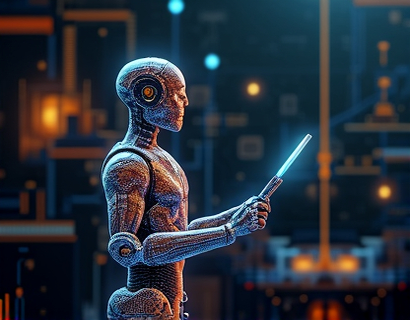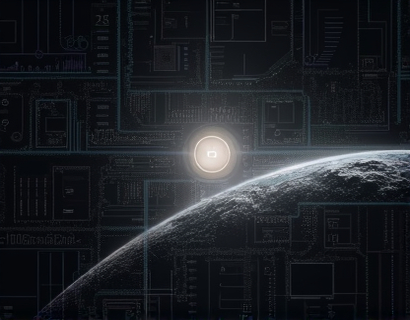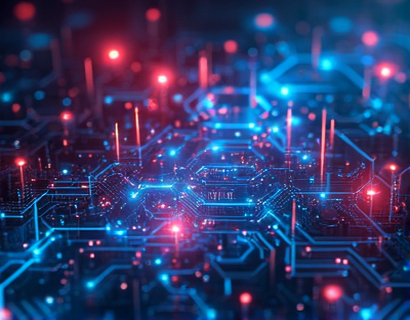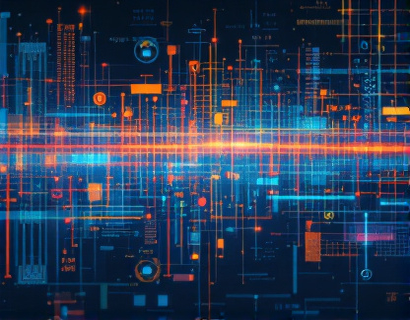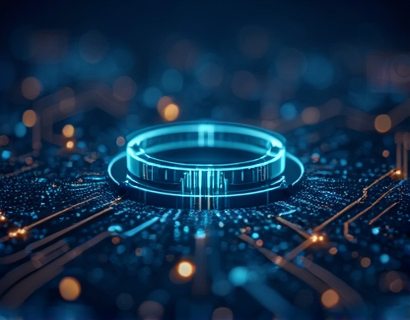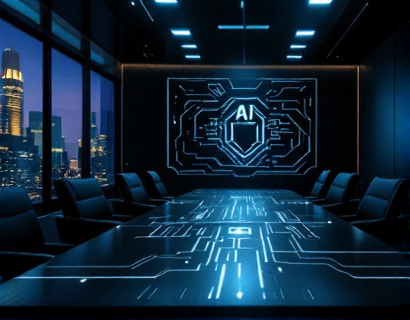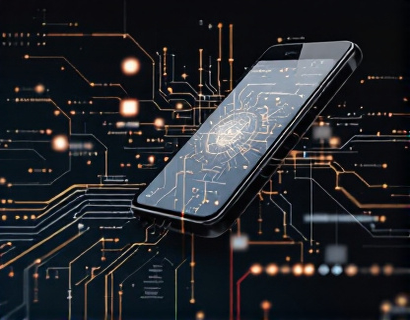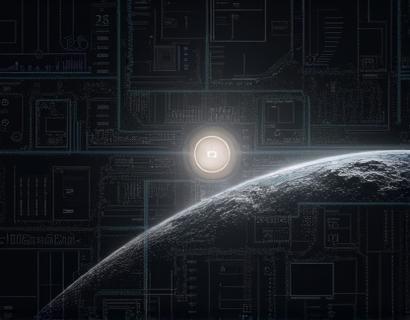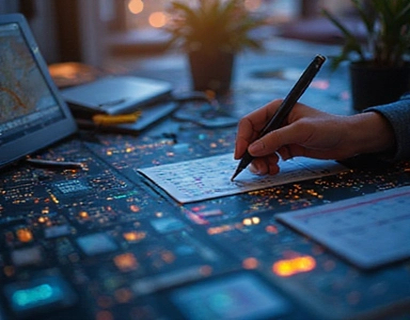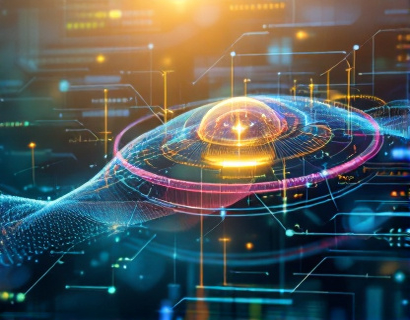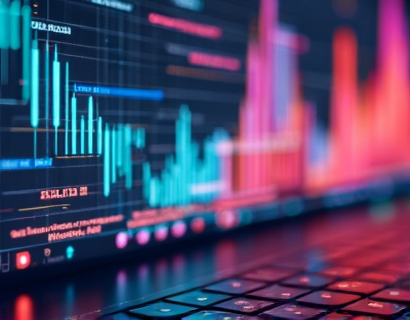Unleashing the Future of Digital App Solutions with Advanced Technology
The intersection of cryptocurrency and artificial intelligence (AI) is giving birth to a new era of digital applications that promise to redefine user experiences. This fusion is not just about combining two cutting-edge technologies; it's about creating a synergy that enhances efficiency, security, and innovation. As we delve into this transformative landscape, it's essential to understand how these advanced technologies are reshaping the digital world and what this means for tech enthusiasts and professionals alike.
Understanding the Basics: Cryptocurrency and AI
Cryptocurrency, since its inception with Bitcoin in 2009, has evolved from a niche digital currency to a fundamental component of the global financial system. It operates on blockchain technology, a decentralized ledger that ensures transparency, security, and immutability. On the other hand, AI refers to the simulation of human intelligence processes by machines, particularly computer systems. These processes include learning (the acquisition of information and rules for using it), reasoning (using rules to reach approximate or definite conclusions), and self-correction.
When combined, cryptocurrency and AI leverage their unique strengths to create solutions that are more robust and intelligent. Cryptocurrency provides a secure and decentralized platform for transactions, while AI brings in the intelligence to analyze, predict, and automate complex processes. This combination is particularly potent in the realm of digital applications, where user experience and security are paramount.
The Role of Blockchain in Enhancing Security
One of the most significant contributions of blockchain technology to digital applications is its ability to enhance security. Traditional centralized systems are vulnerable to hacking and data breaches, as they rely on a single point of control. Blockchain, being decentralized, distributes data across a network of computers, making it extremely difficult for malicious actors to alter or steal information. This inherent security feature is crucial for applications that handle sensitive data, such as financial transactions, health records, and personal identification.
Moreover, blockchain's use of cryptographic algorithms ensures that transactions are secure and tamper-proof. Each transaction is verified by multiple nodes in the network, and once confirmed, it is added to a block that is linked to the previous block, forming a chain. This chain of blocks, or blockchain, is stored on every participant's computer, creating a transparent and immutable record. For digital applications, this means users can trust the integrity of the data and the transactions, leading to increased adoption and reliability.
AI-Driven Enhancements in Cryptocurrency
AI is revolutionizing the cryptocurrency space by providing advanced analytics, predictive modeling, and automated trading. Machine learning algorithms can analyze vast amounts of data to identify patterns and trends that humans might miss. This capability is invaluable for market analysis, risk management, and optimizing investment strategies. For instance, AI can predict price movements based on historical data, news sentiment, and other factors, helping traders make more informed decisions.
Additionally, AI-powered bots can execute trades automatically, following predefined strategies and adapting to market conditions in real-time. This not only increases efficiency but also reduces the emotional bias that human traders might introduce. Smart contracts, self-executing contracts with the terms directly written into code, are another AI-driven innovation. They automate and enforce contractual obligations without the need for intermediaries, reducing costs and increasing trust.
Decentralized Applications (DApps) and AI
Decentralized Applications, or DApps, are a prime example of how blockchain and AI can converge to create innovative digital solutions. DApps operate on a blockchain network and are decentralized, meaning they are not controlled by any single entity. This decentralization, combined with AI's intelligence, results in applications that are more resilient, transparent, and user-centric.
AI can enhance DApps by providing intelligent user interfaces, personalized experiences, and automated decision-making. For example, a DApp for financial planning could use AI to analyze a user's financial data and provide tailored recommendations. The blockchain ensures that all data and transactions are secure and transparent, while the AI handles the complex computations and insights generation.
Enhancing User Experiences with AI
The integration of AI in digital applications goes beyond backend processes; it significantly improves the user experience. AI-driven chatbots and virtual assistants can provide 24/7 customer support, answering queries and resolving issues in real-time. These AI assistants can understand natural language, learn from interactions, and adapt to user preferences, making the interaction more seamless and intuitive.
Personalization is another area where AI shines. By analyzing user behavior and preferences, AI can curate content, recommend products, and tailor the overall experience to individual needs. This level of personalization not only enhances user satisfaction but also increases engagement and loyalty. In the context of digital applications, this means users are more likely to return and recommend the service to others.
Security and Privacy: A Dual Benefit
Security and privacy are critical concerns in the digital age, and the combination of blockchain and AI addresses these issues effectively. Blockchain's decentralized and immutable nature ensures that data is secure and less susceptible to breaches. AI, on the other hand, can detect and mitigate threats in real-time, enhancing the overall security posture of digital applications.
Privacy is another area where this fusion excels. Blockchain can be used to create secure and private data storage solutions, ensuring that sensitive information is only accessible to authorized parties. AI can further enhance privacy by implementing advanced encryption techniques and anonymization methods. For instance, differential privacy, a technique that adds noise to data to protect individual identities, can be powered by AI algorithms to ensure that user data remains confidential while still being useful for analysis.
Case Studies: Real-World Applications
To better understand the practical implications of blockchain and AI, let's look at some real-world applications. In the finance sector, a leading bank has implemented a blockchain-based platform for trade finance, using AI to automate and streamline the process. This platform reduces the time and cost associated with manual paperwork and verification, while ensuring transparency and security.
In the healthcare industry, a startup has developed a DApp that uses AI to analyze medical records and provide diagnostic recommendations. The blockchain ensures that patient data is secure and privacy-compliant, while the AI enhances the accuracy and efficiency of diagnoses. This not only improves patient outcomes but also reduces the workload on healthcare professionals.
Another example is in the supply chain management space, where a company has integrated blockchain and AI to track and verify the authenticity of products. The blockchain provides a transparent and immutable record of the supply chain, while AI algorithms analyze data to detect anomalies and predict potential issues. This combination ensures that products are genuine and reduces the risk of fraud.
Challenges and Considerations
While the potential of blockchain and AI is immense, there are several challenges and considerations that need to be addressed. One of the primary challenges is the technical complexity involved in integrating these technologies. Developers need a deep understanding of both blockchain and AI to create effective solutions. Additionally, the scalability of blockchain networks remains a concern, as they can struggle to handle high transaction volumes.
Regulatory issues also play a significant role. The decentralized nature of blockchain and the innovative use of AI can sometimes fall into regulatory gray areas. Ensuring compliance with existing laws and regulations, while advocating for supportive policies, is crucial for the widespread adoption of these technologies.
Another consideration is the ethical use of AI. As AI becomes more integrated into digital applications, ensuring that it is used responsibly and ethically is paramount. This includes addressing biases in AI algorithms, ensuring data privacy, and maintaining transparency in decision-making processes.
The Future of Digital App Solutions
The future of digital app solutions lies in the continued convergence of blockchain and AI. As these technologies mature and become more accessible, we can expect to see even more innovative applications across various industries. The synergy between decentralization and intelligence will drive the development of more secure, efficient, and user-friendly digital experiences.
For tech enthusiasts and professionals, staying informed about the latest advancements in blockchain and AI is essential. Continuous learning and experimentation will be key to harnessing the full potential of these technologies. Whether you're a developer, a business leader, or a curious individual, the intersection of cryptocurrency and AI offers a wealth of opportunities to shape the future of digital interactions.
In conclusion, the fusion of cryptocurrency and AI is not just a technological trend but a transformative force that is redefining the digital landscape. By leveraging the strengths of both blockchain and AI, we can create digital applications that are more secure, intelligent, and user-centric. As we move forward, embracing this convergence will be crucial for anyone looking to stay ahead in the rapidly evolving world of technology.






